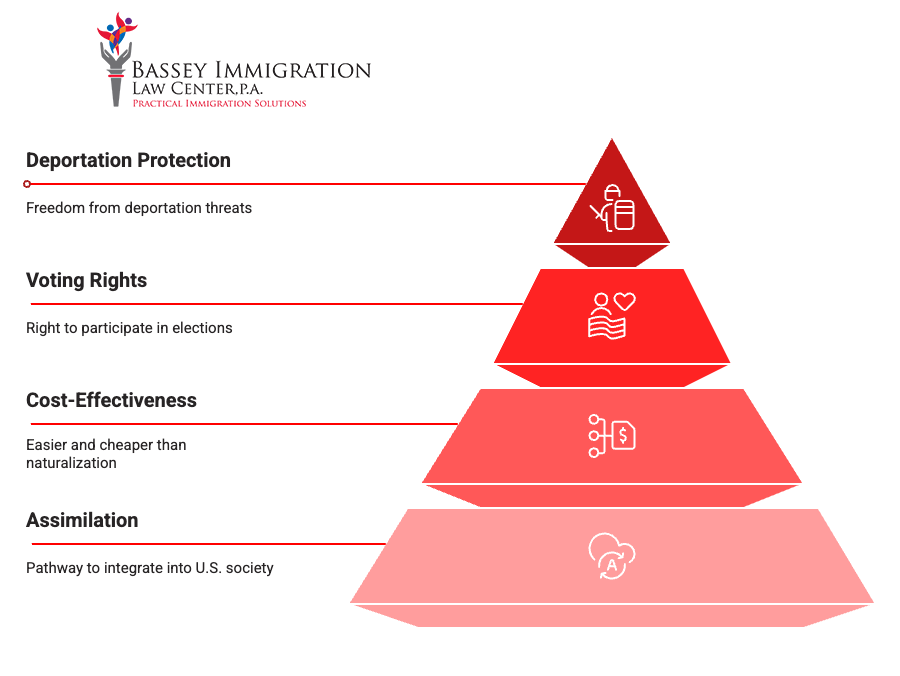What Is Birthright Citizenship?
Birthright citizenship is rooted in the Fourteenth Amendment to the U.S. Constitution, which states, “All persons born or naturalized in the United States and subject to the jurisdiction thereof, are citizens of the United States and of the State wherein they reside.” It may seem simple, but a closer look at this long-standing doctrine reveals hidden nuances and vulnerabilities political opponents are eager to seize upon.
The immigration lawyers at Bassey Immigration Law Center are here to help you realize your dream of living and working in the U.S. Our seasoned, ethnically diverse, multilingual team of lawyers is inspired by clients with citizenship goals. We always welcome the opportunity to help you build your life. We can answer your questions about how birthright citizenship works and affects your family. Contact us today to schedule a consultation.
How is Birthright Citizenship Defined?
“An Exploration of Birthright Citizenship,” published in The Immigration and Human Rights Law Review, defines it as:
- “(1) when a person is born within United States territory, also known as jus soli (the law of the soil) and
- (2) when one or both of an individual’s parents are United States citizens, thus the parents convey citizenship unto their child, also known as jus sanguinis (the law of the bloodline).”
In addition, as noted above, the doctrine is rooted in the Fourteenth Amendment to the U.S. Constitution. Generally, this means that U.S. citizenship is automatically granted to children born in:
- Any U.S. state
- Washington D.C.
- The U.S. territories of Puerto Rico, Guam, the U.S. Virgin Islands, and the Northern Mariana Islands
Birthright citizenship does not apply to children born to diplomats and certain recognized officials from other countries.
Birthright Citizenship is a Valuable Right
The benefits of birthright citizenship are both immediate and permanent. If you were born in the U.S., you are a citizen for life, even if your family moved to another country after you were born and you have spent most of your life there.
What are the Benefits of Birthright Citizenship?

The benefits of birthright citizenship include the following:
- A pathway to assimilate into U.S. society
- A much easier and less costly path to citizenship than going through the naturalization process
- The right to vote
- Freedom from the threat of deportation
The promise of birthright citizenship has drawn millions to America and its territories, even if their parents never realize their dreams of becoming full-fledged U.S. citizens.
It assures that children born here are granted full citizenship upon birth, regardless of the immigration status of their parents. At least, this is the way it has worked for generations of Americans. Threats to birthright citizenship abound, especially in the polarized political environment surrounding immigration law.
Challenges to Citizenship
Political opponents have devised many challenges to citizenship over the years. Some seek to reexamine the language of the Fourteenth Amendment and apply new interpretations. Some claim that birthright citizenship should not apply to children of undocumented immigrants.
Those in favor of reform point to abuses of immigration laws and practices such as “birth tourism,” in which parents plan for their children to be born in the U.S. for the sole purpose of attaining citizenship for them.
While these reforms have largely failed to gain traction in Congress, threats to the current system are persistent. Because immigration law is fluid and changes could affect you and your family, you should always consult with a lawyer who is current on immigration law before making any important decisions.
Speak With an Experienced Immigration Lawyer
At Bassey Immigration Law Center, we are immigration lawyers for citizenship and strong advocates for those seeking to live and work in the U.S. If you have questions about birthright citizenship or other immigration law matters, contact us for a legal consultation.
About Bassey Immigration Law Center, P.A.
Bassey Immigration Law Center, P.A., led by attorney Aniefiok Bassey, provides comprehensive immigration services to individuals, families, and businesses in Florida and beyond. With over 20 years of experience, the firm assists clients with a wide range of immigration matters, from family reunification and green cards to business visas and deportation defense. The diverse, multilingual team is dedicated to supporting clients through the complex immigration process, with a special focus on citizenship, asylum, and LGBTQ+ immigration needs. They offer affordable initial consultations and are committed to delivering personalized, strategic guidance for achieving clients’ immigration goals.



